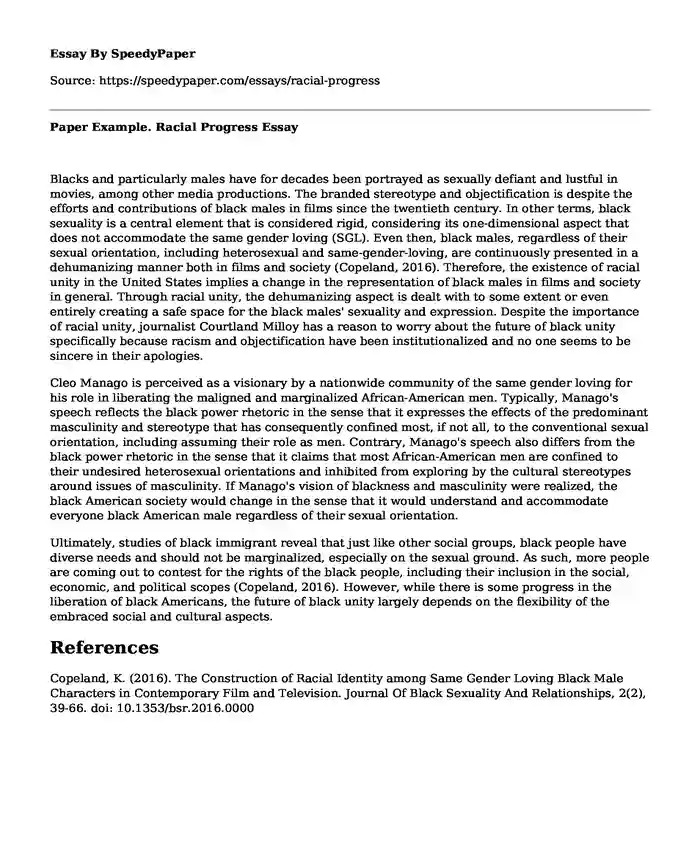
| Type of paper: | Essay |
| Categories: | Race Discrimination Stereotypes Human sexuality |
| Pages: | 2 |
| Wordcount: | 437 words |
Blacks and particularly males have for decades been portrayed as sexually defiant and lustful in movies, among other media productions. The branded stereotype and objectification is despite the efforts and contributions of black males in films since the twentieth century. In other terms, black sexuality is a central element that is considered rigid, considering its one-dimensional aspect that does not accommodate the same gender loving (SGL). Even then, black males, regardless of their sexual orientation, including heterosexual and same-gender-loving, are continuously presented in a dehumanizing manner both in films and society (Copeland, 2016). Therefore, the existence of racial unity in the United States implies a change in the representation of black males in films and society in general. Through racial unity, the dehumanizing aspect is dealt with to some extent or even entirely creating a safe space for the black males' sexuality and expression. Despite the importance of racial unity, journalist Courtland Milloy has a reason to worry about the future of black unity specifically because racism and objectification have been institutionalized and no one seems to be sincere in their apologies.
Cleo Manago is perceived as a visionary by a nationwide community of the same gender loving for his role in liberating the maligned and marginalized African-American men. Typically, Manago's speech reflects the black power rhetoric in the sense that it expresses the effects of the predominant masculinity and stereotype that has consequently confined most, if not all, to the conventional sexual orientation, including assuming their role as men. Contrary, Manago's speech also differs from the black power rhetoric in the sense that it claims that most African-American men are confined to their undesired heterosexual orientations and inhibited from exploring by the cultural stereotypes around issues of masculinity. If Manago's vision of blackness and masculinity were realized, the black American society would change in the sense that it would understand and accommodate everyone black American male regardless of their sexual orientation.
Ultimately, studies of black immigrant reveal that just like other social groups, black people have diverse needs and should not be marginalized, especially on the sexual ground. As such, more people are coming out to contest for the rights of the black people, including their inclusion in the social, economic, and political scopes (Copeland, 2016). However, while there is some progress in the liberation of black Americans, the future of black unity largely depends on the flexibility of the embraced social and cultural aspects.
References
Copeland, K. (2016). The Construction of Racial Identity among Same Gender Loving Black Male Characters in Contemporary Film and Television. Journal Of Black Sexuality And Relationships, 2(2), 39-66. doi: 10.1353/bsr.2016.0000
Cite this page
Paper Example. Racial Progress. (2023, Jul 13). Retrieved from https://speedypaper.net/essays/racial-progress
Request Removal
If you are the original author of this essay and no longer wish to have it published on the SpeedyPaper website, please click below to request its removal:
- Representation of Immigrants in America Today
- Essay Sample on Human Trafficking around the World
- What Are Gender Roles Essay Sample
- Free Essay with the Article Review: Gender and Sexuality In the Workplace
- Free Essay on Sexist Bias in Michelangelo Antonioni's The Red Desert
- Essay Sample on Religion and Religious Oppression
- Christmas in Italy. Essay Sample
Popular categories




